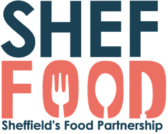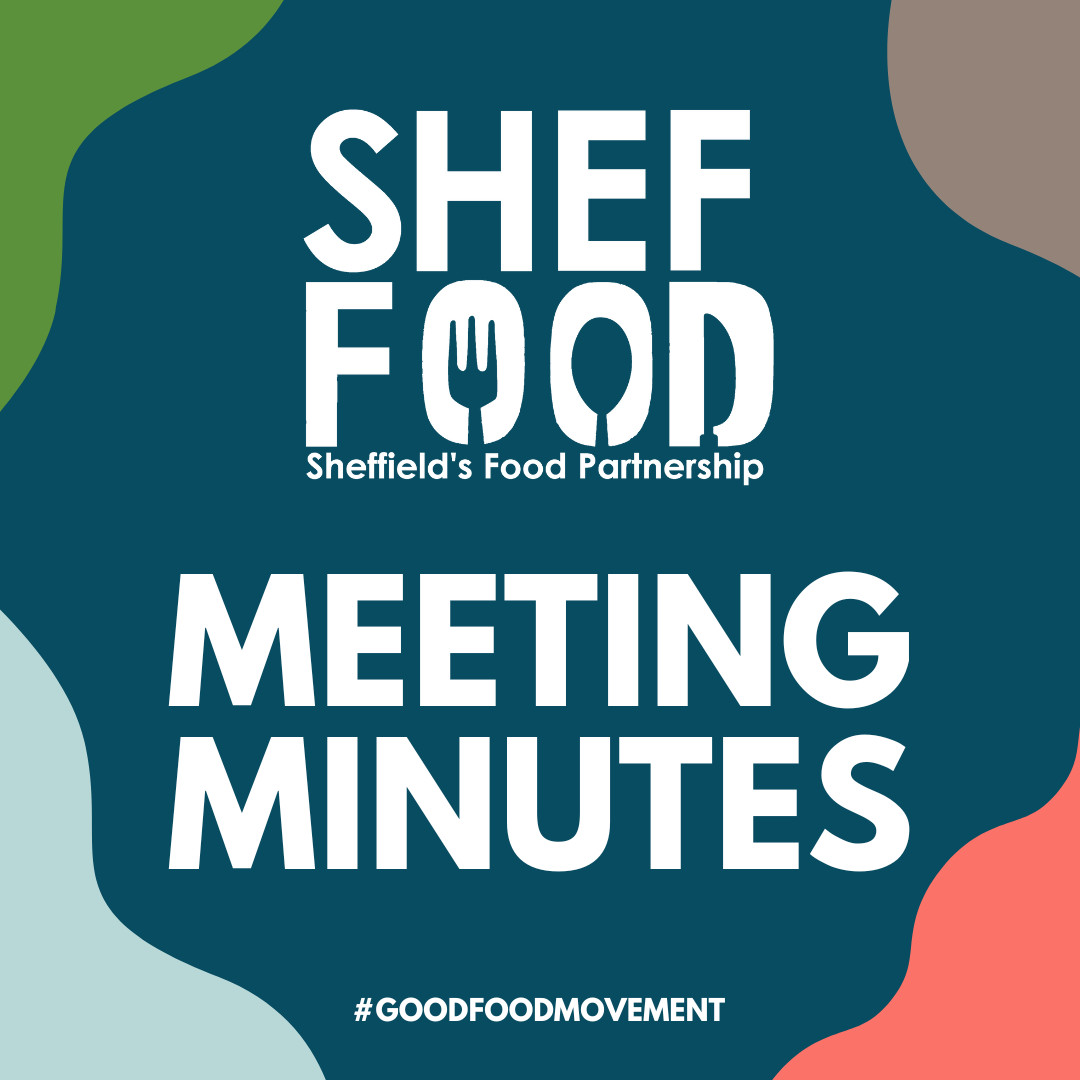Good Food Economies Meeting 2
31-01-23, 1-3pm, Blend Kitchen.
Attendees
| Name | Organisation | Name | Organisation | Name | Organisation |
| Selina Treuherz (Working Group Co-host) | ShefFood | Julia Kirby-Smith | Better Food Shed + Better Food Traders | Elaine Harrison | NHS / SHSC |
| Martin Yarnit (Working group co-host) | Freelance researcher | Neil Pierson | The Sheffield College | Lana Simpson | City / Centre food policy |
| Eddie Andrew | Our Cow Molly | Tony Murphy | SSEN | Esther Morrison | Paprika Food Consultancy |
| Naomi Fallon | Centre for Food Policy | Sally Pepper | Business Sheffield | Sophie Rowson | ShefFood |
| Ed Dawson | Sheffield Made | Natalie Flanagan | FoodWorks | Peter Anstess | UNICUS – University of Sheffield |
| Christina Lima Trindade | Business Sheffield / Wild Acre | Alison Bent | NHS | Micahel Arthur | Sheffield Hallam University |
| Yvonne O’Donovan | AMBEL School of Artisan Food | Jade Clarke | UoS allotment society | Chris Yapp | Researcher – FixOurFood |
Background to the Good Food Economy Working Group:
ShefFood is a cross-sector partnership aiming to share knowledge and drive change so that everyone in Sheffield has access to the food they deserve. ShefFood is facilitating the development of a multi-stakeholder Local Food Action Plan to identify and celebrate what’s already happening, and to work out where we can work together towards making a more fair and sustainable food system in Sheffield.
To develop the action plan, Sheffood is hosting 5 working groups, each tackling a particular issue/theme, and collectively representing the Sheffield food system.
Good Food Economies is the newest of the ShefFood working groups, and this is the first official meeting!
The goal of the Good Food Economies Working Group is to assess the state of the local food economy, map current initiatives and gaps in provision, and identify areas where we can productively work together to improve procurement, distribution and access to sustainable food for everyone in the city.
Aim of this meeting:
- Bringing together actors involved in procurement, to establish what is already being done in the city, where we need to go & the roles of different actors.
- Discussions focused on exploring what a ‘gold standard’ for food procurement would look like and identifying some of the group’s shared challenges or goals.
- The discussions in the meeting will feed directly into the ‘Good Food Economy’ section of the multi-stakeholder Local Food Action Plan. ShefFood also wants to support organisations with developing their own sustainable procurement policies.
Who did we hear from? What was discussed? What did we learn?
- Introductions
- Selina Treuherz began by welcoming everyone to the meeting, introducing ShefFood, and the Good Food Economy working group.
- Each stakeholder in attendance (listed above) introduced themselves and their interest in the working group.
- We heard from a number of speakers, who each shared some additional information and context:
Chris Yap
- Introduced the Fix Our Food project, one pillar of which is regenerative food systems in South Yorkshire.
- Lots of energy in Local Food Plans across UK but limited legal and infrastructural backing; its clear that councils can’t be the prime mover in making local food systems work – instead, multistakeholder partnerships are required.
- Chris and Selina are working together on developing Sheffield’s Local Food Action Plan (LFAP) AND identifying learning regarding the process of developing LFAPs which can be translated to other contexts
- Plan to launch Local Food Action Plan in April 2023.
Martin Yarnit
- COVID has increased demand for local sustainable food, but it only accounts for 4-5% of national grocery spend.
- Question: if Sheffield set 10% target, could we meet supply?
- “Institutional consumers” (i.e. organisations that consume food, rather than individuals) are the key to driving demand for good local food e.g. by setting % targets for procuring food that is locally produced, non-processed, and plant-based.
- Regulatory/policy context:
- Public Procurement bill will see criteria beyond £ being prioritised in procurement targets
- Likely increase in legal frameworks, funding etc. to support sustainable food procurement
Peter Anstess
- University of Sheffield (via UNICUS) example of using successful partnerships between academic research, procurement team, and local suppliers to look carefully at how food procurement practices can be improved – lots of changes made already and potential for more.
- Small Group Discussions
5 groups explored:
- What would a ‘gold standard’ for procurement look like?
- Where are we now?
- What actions can we take to get there?
- Sharing key discussion points as a whole group
Some of the ideas presented back to the whole group from the sub- discussion groups included:
- What do we mean by ‘sustainable’ food?
- Fair for: buyers, sellers and consumers
- Local procurement
- Nutritional balance
- Legume-based non-meat diets
- Diets aligned with what can be grown locally, and seasonally
- Fresher food
- Reducing waste (e.g. waste diversion)
- Equal access (not limited by income/affordability)
- Diversity of choice
- Sustainable food as opportunity for education, good jobs, upskilling
- A shift in how we define ‘good value’ – going beyond economic concerns to social, environmental, community value etc.
- Need for shared definition of ‘local’: comments around this included:
- Spatial/geographical definition of ‘local’ that specifies food GROWN/produced within defined radius of Sheffield (thereby reducing scope for food grown elsewhere but processed or packaged in Sheffield to be branded and treated as ‘local’) / quantified definition setting out miles from production to consumption
- Temporal understanding of ‘local’
- “Sheffield first”
- “Local as far as possible”
- Accountability against the definition
- Suggestion of Derbyshire council as best practice on defining ‘local’
- Sustainable food procurement policies need integration with land procurement policies (which prioritise/grant concessions to local sustainable good food businesses/producers)
- Need to make what’s already being done around procurement visible, celebrated, and accessible so that 1) individual and institutional consumers know where to buy e.g. via directories, and ‘meet the buyer’ events and 2) other organisations can replicate/adapt sustainable procurement practices for own purposes
- Need improved infrastructure for distribution/logistics – also involves pooling resources e.g. a central distribution hub rather than each producer having own distrubution system
- Price – sustainable local food not always affordable/ inclusive for everyone in the city, but should be (price not just an issue for end consumer, but retailers too)
- Important to acknowledge role of in/convenience: money and knowledge aside, there are barriers to buying 100% local associated with convenience – how can we reduce these barriers?
- Barrier for ‘institutional consumers’ – already tied into existing contracts with large companies – ‘hands tied’
- Generous investment (esp from council and ‘institutional consumers’) in local food businesses that enables them not just to survive, but thrive – is needed – in monetary terms but also support with business knowledge, standards compliance, accessing loans etc.
- Need mapping exercises to:
- Establish inventory/directory of local sustainable producers and suppliers
- Understand current supply/consumption of different food sources in % terms
- Understand availability of land through which supply could be increased
- Understand and share knowledge re. existing procurement practices
- Emphasis on fact that prioritisation of local businesses over big corporations in procurement IS possible and already happening elsewhere (e.g. Preston local authority) – what can we learn from these examples? – good practice in procurement most effective when sustainable/local supported and prioritised from both bottom up and top down.
(See full notes from each group at end of document)
Next steps:
- Discussions to be integrated into Local Food Action Plan:
- Highlighting from small break out discussions of the great examples of sound procurement practices in Sheffield- a gold standard framework
- A sheffield app of all the exciting businesses- what would Sheffield Eats look like in 2023?
- How do we relate to other parts of the ShefFood action plan?
- ShefFood to support any organisations present with developing sustainable food procurement policies and practices
- Next working group meeting: Weds 8th March, 1-3pm, Marmadukes Sorting Cafe

